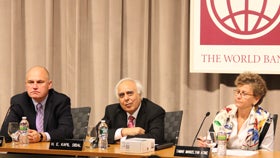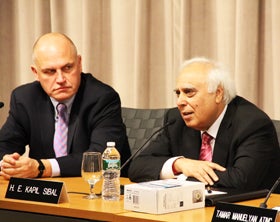 It is India’s future that keeps Mr. Kapil Sibal, India’s Human Resource Development (HRD) Minister, awake. Last week, the World Bank hosted Mr. Kapil Sibal who spoke to a 120 strong crowd about “India and the World – Lessons Learnt and Contributions Towards the Global Knowledge Economy. “ During the lively discussion chaired by World Bank’s Tamar Manuelyan Atinc (Human Development Network Vice President) and moderated by Michal Rutkowski (South Asia Human Development Director. Mr. Sibal highlighted how India can contribute to the global knowledge economy.
It is India’s future that keeps Mr. Kapil Sibal, India’s Human Resource Development (HRD) Minister, awake. Last week, the World Bank hosted Mr. Kapil Sibal who spoke to a 120 strong crowd about “India and the World – Lessons Learnt and Contributions Towards the Global Knowledge Economy. “ During the lively discussion chaired by World Bank’s Tamar Manuelyan Atinc (Human Development Network Vice President) and moderated by Michal Rutkowski (South Asia Human Development Director. Mr. Sibal highlighted how India can contribute to the global knowledge economy.
Mr. Sibal, a well known Indian politician, is famous for his effort in enacting the Right of Children to Free and Compulsory Education (RTE) Act, which provides every child between 6-14 years free and compulsory education. With so many challenging issues to be solved for education in India, I was impressed with what Mr. Sibal has implemented so far as well as his grand vision for leading the country to achieve continued growth and prosperity.
While he spoke about several topics ranging from teachers’ quality, comprehensive continuous evaluation (new student assessment framework), and national vocational education qualifications framework, two things caught my attention. The first was a $35 tablet PC, Akash, meaning “Sky” that he showed the audience. The ministry plans to provide these innovative and affordable devices to students deprived of internet access, in an effort to enhance access and connectivity in education. The tablet PC is one of the tools that the HRD ministry wishes to leverage to achieve one of their goals -universal access to quality secondary education by 2020. India’s investment in basic education over the past decade through the Sarva Shiksha Abhiyan (SSA) program has achieved an enrollment rate that is close to 100% (net enrolment ratio of primary level education was 98% in 2009-10). However, the quality of education remains a challenge although efforts are being made to address these issues. I hope that Akash will not only be a gadget to attract attention, but can also serve as a platform to help solve these issues in an innovative way.
 Second, Mr. Sibal emphasized the importance of higher education. In order to generate wealth, ideas, innovation, and new services in the country, universities play a key role through developing industry-university relationships and conducting research. As a part of the higher education reform, Mr. Sibal plans to increase the number of accredited institutions and open up education to the private sector, collaborate with foreign universities, and offer dual degree programs to increase the educational options for students. I believe that this will spur more competition among universities and enhance the quality of education in the future.
Second, Mr. Sibal emphasized the importance of higher education. In order to generate wealth, ideas, innovation, and new services in the country, universities play a key role through developing industry-university relationships and conducting research. As a part of the higher education reform, Mr. Sibal plans to increase the number of accredited institutions and open up education to the private sector, collaborate with foreign universities, and offer dual degree programs to increase the educational options for students. I believe that this will spur more competition among universities and enhance the quality of education in the future.
Listening to Mr. Sibal’s speech motivated me to contribute my best as part of the World Bank’s education team. When I participated in the joint review mission for SSA this summer, I saw how his vision has been implemented on the ground. For example, each state is taking innovative actions to improve the quality of education and involving communities in overseeing what is happening in schools. One thing I noticed was the need for states to communicate more effectively among another and implement best practices. This will allow Mr. Sibal's vision of universal education and building a knowledge economy to be implemented quickly and successfully.
It was very fulfilling to hear Mr. Sibal’s vision for India’s future as an emerging leader in the global knowledge economy; as a result, I can sleep better at night.


Join the Conversation